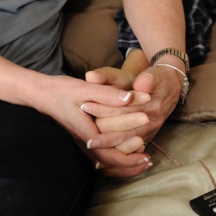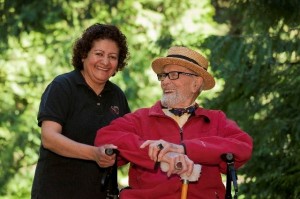Submitted by Joan Hitchens for Navigating Grief
The family caregiver: is this the best job ever or the best job never?

Are you a family caregiver? The one designated and dedicated to caring for a loved one through dementia, illness, or chronic disabilities that require ongoing assistance for sustaining the best quality of life possible for that person?
Being a family caregiver is the best job you may never want. For many, you wouldn’t trade the heart-held work for anything. Probably literally. The sacrifices are big, often necessary, and daunting. Caregivers place their own life on hold for the one cared for. The position can become a 24/7 job. The identity between caregiver and care receiver are intertwined as they often become one person getting through the day together.
It can last a lifetime – yours or your loved one’s – if there are circumstances from birth or early childhood that require advocacy and daily living support on their behalf. It can be short – just a few days or weeks – reeling in the sudden change of debilitating life and death emergency or accident; or it may be a few months to many years if slow end-of-life illness takes over or dementia erodes the mind of a loved one. Yet, you wouldn’t change a thing because you don’t know how or won’t step aside because of love, care and compassion. For the time, you do what you must regardless of cost – emotional, physical, financial, spiritual.
Family caregivers are daughters, son, wives, and husbands. Sometimes friends, cousins, nieces or nephews. Grandmothers and grandfathers, too. We often simplify the family caregiver as fulfilling a necessary life circumstance, and perhaps even a chosen vocation in the moment, but underneath lies an unspoken dedication, obligation and commitment that is far more than simple.
Is being a family caregiver the best job ever or never? Consider these very real mixed messages and dilemmas a family caregiver often confronts along the journey:
- Grateful for the time spent together and resentful of no time to be and do for oneself.
- A desire to go out and about but unwilling to leave the loved one in some else’s care (for a variety of reasons.)
- Willing to leave the care to someone else but can’t find the proper help or support.
- Finally getting out of the house only to use the time for personal doctor appointments and to pick up stuff for the loved one.
- Finding time and support to get out only to realize there is nowhere to go because you’d really like to just be home and with yourself relaxing somehow.
- Being needed and preferred by the loved one and smothered by the realization you are seemingly indispensable.
- Providing better and more considerate care to the loved one than to self.
- Becoming an expert in how-tos even if your inclination might not be in that particular area of expertise (such as medical care, bath aid, nutritionist or diagnostic researcher). Forced into on-the-job training without a manual.
- Crossing uncomfortable boundaries of body care, or changing and reversing roles, such as when the child makes decisions for a parent.

- Putting own life on hold in order to hold onto life for the other.
- Feeling unstated grief and loss for the one you care for and love as your move through the changes.
- Accepting praise for the service at the same time you feel that it can’t be understood just how hard the life is as family caregiver.
- Experiencing every emotion imaginable from anger to love, fear to empathy, hate to joy, and guilt to acceptance.
- Wanting it all to end. Wanting it to never end.
The family caregiver’s job is simultaneously the most difficult and rewarding job ever. You may never want to take this job, but if you do, you are not alone. You don’t have to be isolated. You will be changed. It will be difficult. It will be rewarding. There is hope!
The bottom line is that family caregivers are people of compassion, love and desire to provide. Whether by choice or circumstance, they step in and step up for our loved ones. Family caregivers do they best they can with what they know in that moment. At the end of the day, the intense duty and learning curve is its own form of life affirming experience that makes the family caregiver into the person you see and respect today.
We can all be important support in the caregiver’s village by providing gifts of time, money, encouragement, hope and resources toward the care of the caregiver and their loved one. A small gesture of understanding for the caregiver’s well-being carries a big message.
Here is an opportunity to recognize a caregiver in your life. Nominate an outstanding caregiver(paid caregivers in facilities and unpaid family caregivers) that deserve a night of fun and recognition. When someone notices and listens we heal, grow and forgive. Senior Action Network Caregiver Recognition Dinner is held each Fall. To learn more about the Caregiver Recognition Dinner and nominate a special caregiver in our community click here.


















































